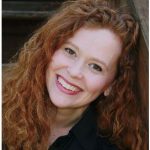Growing up as an only child with a single mother, I felt a lot of responsibility for people’s happiness at an early age. My mom gave me unconditional love and wisdom as she raised me, but I was the only constant person she could lean on, even as a young child. Surrounded by dysfunctional adults, I became the “solution” to everyone’s problems – the entertainment, the comic relief, the joy. The experience of my childhood solidified my empathic nature, as I bore the weight of responsibility for others long before I even realized it.
As a teen and young adult, I often involved myself in situations that were not my business, because I was “just trying to help.” As a teacher and theatre artist, I have spent countless hours in (amateur) therapy sessions with students, even ”saving” young people by taking them into my home, sometimes to the detriment of my own family. As a friend and family member, I often put my own needs or wants last, and sometimes can’t even figure out what my own needs or wants are, because I just want everyone else to be happy. In short, I have always struggled to find a balance between responsibility for others and responsibility for myself.
The last five years have been the most painful and challenging years of my life. Sometimes the hardest choice is the right one, for along all of the pain and suffering there has been so much learning. I have learned that I cannot be responsible for other people’s happiness.
I am only responsible for myself.
I can only control my own actions.
Yes, of course I am responsible for my children’s safety and well-being, but as they grow up, they must become increasingly responsible for themselves. There are ways I can encourage that, instead of hindering their independence by enabling them to be helpless because I feel badly for their hardships.
I feel responsible for everyone, but I am actually only responsible for myself.
My grandmother used to say “you can lead a horse to water, but you can’t make him drink.” I have found this to be true more times than I can count. You cannot force someone to make a choice that you wish they would make, or love someone out of their dark place. You can help – you can offer unconditional love and support, but in the end, we each have to make the choice for ourselves.
I believe I am accountable to myself, and to G-d. What that looks like on a daily basis, is striving to be the best human being I can be, first in the ways I treat myself, and then in the ways I treat others. If I am created in the image of G-d, doesn’t that mean I should treat myself as such? To me, that is what Elul is all about. Taking stock of how I walk the planet, how I have missed the mark, but most importantly, focusing on my future growth, and not how I have fallen short in the past.
My cousin Jess, who writes a brilliant blog called Diary of a Mom, has a phrase she uses that she heard first from Oprah. You must secure your own oxygen mask, and then assist your child, or the person next to you who needs help. Without your own mask, you are no good to anyone else. This concept has really helped me in recent years. Sometimes I hear those voices that say I am being selfish when I choose to take care of myself first; but I have learned the hard way what happens when I don’t: I become unable to take care of anyone else. And then, I get on a hamster wheel of despair and guilt, and that is certainly no help to anyone. So first, I secure my oxygen mask, and then I am off to help others find theirs, and learn how to use it.
May we all be sealed for a good year, one in which we keep marching into the future of what
G-d has created each of us to be.

Susan Cherin Gundersheim is the Cultural Arts and Charlotte Jewish Film Festival Director at The Levine Jewish Community Center. She is also a proud member of Temple Beth El’s STAR and Keshet Committees and proud Mama to Hannah, Rebecca and Doron.




